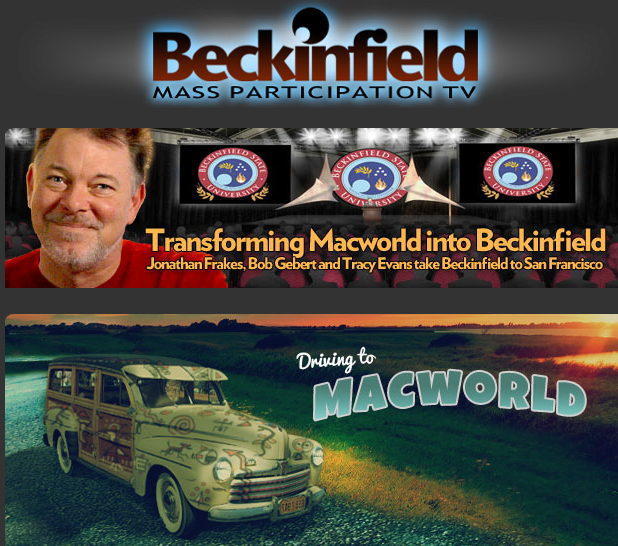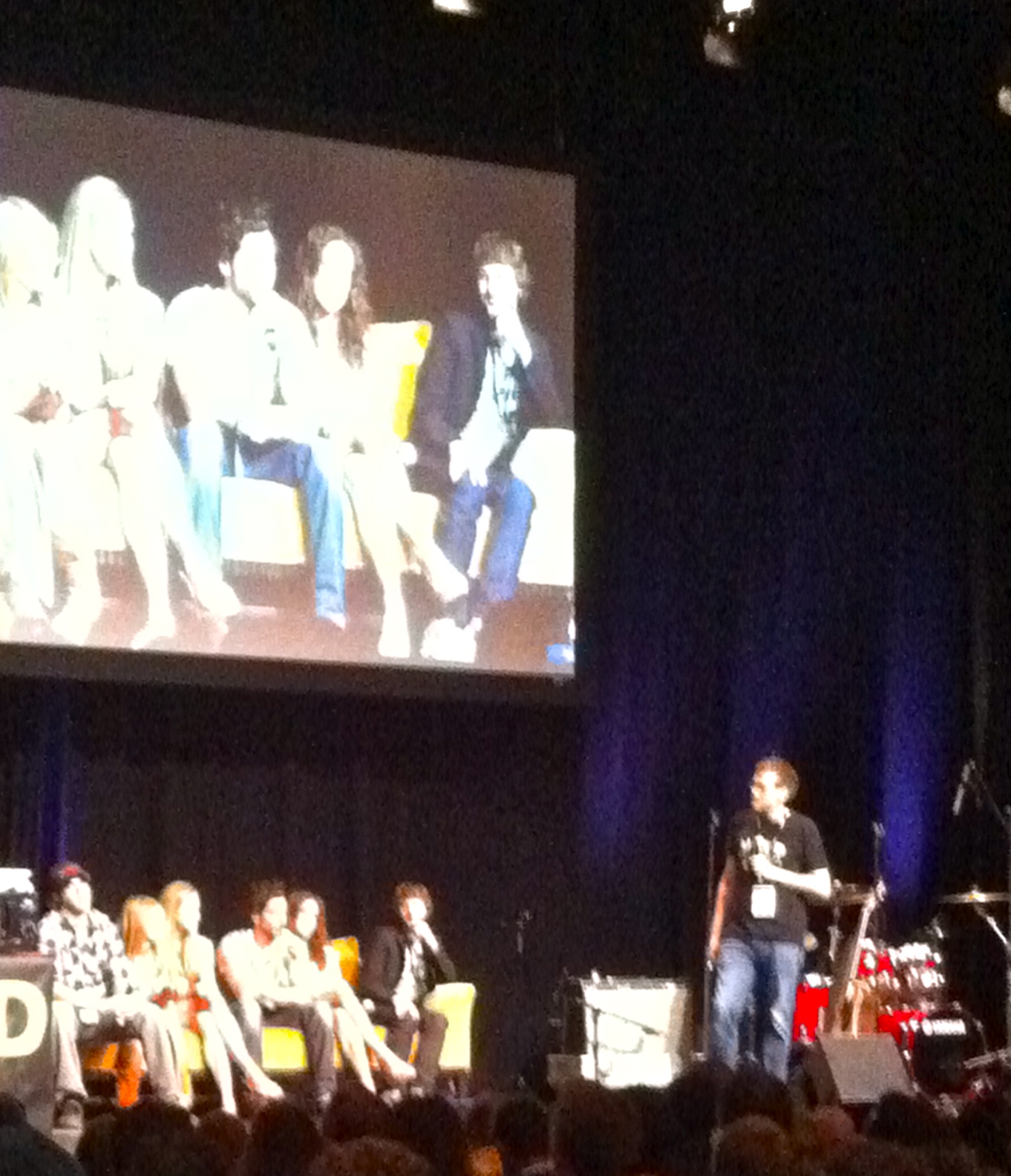Beckinfield posts around the web
 Tuesday, February 21, 2012 at 4:51 PM by
Tuesday, February 21, 2012 at 4:51 PM by  Nick DeMartino
Nick DeMartino DIGITAL MEDIA FROM THE INSIDE OUT: My focus is digital content -- production, distribution, collaboration, innovation, creativity. Some posts have appeared across the web (HuffPo, Tribeca's Future of Film, The Wrap, MIPblog, etc.). To receive these posts regularly via email, sign up for my newsletter here.
 Tuesday, February 21, 2012 at 4:51 PM by
Tuesday, February 21, 2012 at 4:51 PM by  Nick DeMartino
Nick DeMartino  Sunday, February 19, 2012 at 11:13 AM by
Sunday, February 19, 2012 at 11:13 AM by  Nick DeMartino
Nick DeMartino A week of travel did not deter my fierce compulsion to curate. Thus, I offer for your consideration the week's best posts, dumped into the very leaky buckets -- namely TV/video distribution; digital business; and digital content.
If you're in L.A. on Wednesday please drop by the 2nd Screen Summit/TV Goes Social conference in Santa Monica, where I'll be moderating a session on "Curated TV."
"My Goal is to Kill off Television" joked BitTorrent inventor Bram Cohen as he introduced a new P2P live streaming technology last week. Now THAT's a headline that should get somebody's attention.
Have you heard about TV Anytime, an iOS and Android app that allows capture online video for later, offline viewing. Now the app allows users to rip DVDs from their computer desktops to mobile devices. In some ways, this is what the studio-backed UltraViolet app should permit -- e.g., rewarding people who have already bought a DVD, by allowing them to watch their content anytime, anywhere. One can only wish.
It's the season of mega-TV events, each of which seems to be setting new records for social TV and Twitter usage. First it was the Super Bowl, and now it's the Grammy's, analyzed in this very smart post from ITVT. Next up, of course: The Oscars.
Will it work? JTS.tv -- "Just the Story" -- is a subscription site for indie web series. For $4 per month, fans get some exclusive content, and ad-free versions of other web series.
I discovered a post by Eric Spiegelman of The Awl that I quite liked -- his interesting and personal view of "Four Weird Things the Internet is Doing to Our Understanding of Television." Not that I agreed with it all, but props go to thoughtful posts.

Another day, another "era" declared, this time the "era of social cinema" -- this post is really just a news report about the latest embedded movie debuting on Facebook, brought to us by a company called Milyoni. ("Tim and Eric's Billion Dollar Movie" will not, I repeat, not, go down in history as a milestone of any sort.) On the same topic, Paul Marsden suggests that for Facebook to become a competitive distribution platform on par with Apple and Amazon, it must offer "a differentiated and compelling value proposition" enabled by the social graph.
Aereo (formerly known as Bamboom Labs) is a startup that uses micro-antennae technology to offer broadcast channels over the Internet on a subscription basis. Backed by Barry Diller and others, the business will undoubtedly draw litigation, but the team believes it has its bases covered as it launches New York as the first local market.
I've written about the "virtual self" and how the massive stream of data we generate within our digital lifestyles creates a market for user control of our own data. Now the NY Times is reporting on the topic, in particular Shane Green's company Personal
"The Collaboration Curve" is the name given to a new theory that suggests that the "network effect" can be supercharged -- "the more participants--and interactions between those participants--you add to a carefully designed and nurtured environment, the more the rate of performance improvement goes up." Check out this interesting Harvard Business Review piece.
We all love dirty little secrets, and Tom Foremski pulls the cover on one such secret that underlies much of the emerging digital business, namely the vast expanse of fake or empty social media accounts.
Tumblr is a microblogging service with half a billion page views per day, a true phenom. GigaOm offers a summary of a really fascinating technical and business case study of the business. The deeper technical dive is offered by tech site High Scalability. (Geek alert, big time!!)
Check out Gunther Sonnenfeld's super-smart post "5 really, really important shifts (not trends) in media and technology.
Lists -- we love 'em, we hate 'em -- at least I do, and Fast Company's "50 Most Innovative Companies" is no exception. I do appreciate that the list is displayed on a single page -- even display of links for the top ten by industry. Sooo much better than the slideshow format. Learned about some companies I'd never heard about, but ranking "innovation" is nutty on the merits. I'm just saying….
It's been a long time since news about initial public offerings of tech stocks has been so constant and varied -- the Godfather of all stories, of course, is the behemoth Facebook offering. Video platform provider Brightcove had a good week, with shares up 30% on its first day of trading. Will the upcoming Yelp IPO validate user-generated content as a valuable form of wealth creation?
Amazon created a flurry of noise (both pro and con) with the creation of its Amazon Studios initiative, which is a sort of crowd-sourced script marketplace. Now the online commerce behemoth is hiring more original content production executives, as the competition heats up.
The Guardian reports on the "vast digital data operation" of the Obama reelection campaign, including integration of supporters' Facebook social graph, which could be a factor in a presidential election for the first time.
In case you hadn't heard, we are in the "Age of Big Data" -- and if you dig it, you'll be employed for life, according to this article in the NY Times.
Underlying most of our digital businesses, of course, is the computer itself. Technology Review published a lovely and informative historical review of how the computer came to life, and why Alan Turing should be given credit for the "Enduring Importance" of his contributions.
Chris Dorr posits a new business model that allows fans to authorize payment of shows they like AFTER they view them, a kind of inverted Kickstarter in a disruptively smart Tribeca post called "What if You Could Tip A Filmmaker?"
Documentarian Chris Kenneally has a new movie called "Side by Side" that examines the evolution of digital cinema, produced by Keanu Reeves (yes, that guy). North American rights have been purchased by Tribeca Film at Berlin, with a summer release on multiple platforms.
"Web TV's New Lineup" is the headline (somewhat archaic language, eh?) on the Wall St. Journal's gloss on mainstream Hollywood's migration towards the production of web-native series.
Do Movie Review Aggregators Matter? asks The Wrap, reviewing Rotten Tomatoes, MetaCritic and Movie Review Intelligence.
ARGNet does a fine job of reporting on new transmedia and alternate reality games. This week brought reports on two projects from Canada: "Guidestones" is a web series offering embedded clues, hidden story lines, and other goodies. "Bear 71" -- an interactive film from the National Film Board. The "film" puts the viewer into the Bear's point-of-view and is pretty unique.
"The Five Pillars of Transmedia" is a typically smart post from Simon Staffans.
Have you heard of Cowbird? It's a "small community of storytellers focused on a deeper, longer-lasting, more personal kind of storytelling" -- call it the "anti-update" or maybe even the not-Facebook. You must request an invitation to begin posting on your own, but anyone can read. Check it out.
Over at Facebook, the transition to the "Timeline" format continues -- I made the switch this week: Of course, the company's goal is not just a different method of displaying member content, but to generate stickiness by enabling third-party companies to produce "Timeline Apps" which in turn allow users to embed content into their timeline. Here's how FB itself puts it on the FB blog.
Linden Lab acquires text-based game studio LittleTextPeople to extend its universe beyond the bounds of Second Life.
Henry Jenkins' interviews Jared Gardner, author of "Projections: Comics and the History of 21st Century Storytelling."
 Aereo,
Aereo,  Bear 71,
Bear 71,  Brightcove,
Brightcove,  Guidestones,
Guidestones,  JTS.tv,
JTS.tv,  Milyoni,
Milyoni,  TV Anytime,
TV Anytime,  Tumblr,
Tumblr,  Yelp,
Yelp,  big data,
big data,  conferences in
conferences in  Hollywood,
Hollywood,  Internet,
Internet,  NGIF,
NGIF,  best-of,
best-of,  conferences,
conferences,  data,
data,  privacy,
privacy,  social-media,
social-media,  studios,
studios,  technology,
technology,  television ,
television ,  transmedia
transmedia  Print Article
Print Article  Friday, February 10, 2012 at 3:40 PM by
Friday, February 10, 2012 at 3:40 PM by  Nick DeMartino
Nick DeMartino Each week I go back over my Twitter and other posts to see what I found interesting. Follow me on Twitter (@nickdemartino) if you want the daily dose. Otherwise, just subscribe here and get the curated version.

Sometimes I just like a good flame war, those online arguments, usually among the tech elite, that carry a certain angry certitude about things that, meh, I can't really imagine getting so wound up about. Last week Robert Scoble launched one of them with his "open web" screed. You can read about the reaction here, and if you scroll down, there's a link to the original post. In addition, Dave Winer, mentioned therein, has his own flame to add: "Me and Facebook Are Over."
ON a completely different topic: I'm moderating a panel at the 2nd Screen Summit on Feb. 22 in Santa Monica called "Curated TV
The Impact of Celebrity, Expert, Influencer, and Ambassador Curation when exploring and consuming content." Please join me and 60 other speakers.
I've also accepted speaking invitations for Transmedia Hollywood and WyrdCon, and a few others pending. I'll share details when they are firmed up.
My post about BECKINFIELD, the fictional town in which an online sci-fi mystery series is set went live on my blog earlier this week. The interesting thing about the story-form is that all of the content is told via videos created in character by users who register on the site. Tribeca ran the piece on its Future of Film site, as well.
I learned a bunch from this post about ebooks, transmedia, textbooks, and learning.
ARGNet.com bids a "fond farewell" to "This is Not A Game" -- the original mantra of ARG "The Beast," which set many of the templates embraced and revered by the alternative reality game community. I liked the POV and historical info in this post a lot.
Netflix launches "Lilyhammer," the Norwegian TV series starring Steven Van Zandt as a mobster on the run in Scandinavia. It's the first push (in a while) into the content realm for the online movie and TV platform. The Sopranos, it ain't.
"Hollywood by the Numbers" take a look at the movie industry's business models by analyzing data, including the profitability of genres, the summer blockbuster syndrome, why there are no start ups in Hollywood, and the impact of TV on theatrical release patterns. Fascinating. (Thanks to Rob Tercek: @Superplex).
Verizon and Redbox are joining forces to offer a streaming video service, which of course will compete with Netflix, Apple and the others that are out there.
Huffington Post's jump into online video continues to get a lot of attention. But, HuffPo isn't the only text-based publisher that's turning to video production and distribution, competing with the incumbent TV networks and cable channels. Everybody's doing it!
Oh, and online video viewing is up 43% in a year. 100 million Americans are watching. So are a LOT of TV execs!
Silicon Valley's Dirty Little Secret is the fact that many, if not most "exits" for startup companies are "talent acquisitions," in which a larger company buys and often kills a company, just to lock down engineers or other talent in a very competitive labor market.
Meanwhile, crowd-funding site Kickstarter is about to hit a new record, coming close to $1 million for a single project.
Tech superstar Pinterest has hit 10 million US monthly unique visitors in record time
Check out Zeega, a new open-source HTML5 platform for creating Interactive Documentaries.
Innovation Strategy is explored in this useful short post.
(BTW: I posted two book reviews this week: George Pelecanos' THE CUT, and Stephen King's 11/22/63. You can read all of my reviews archived here on Goodreads.com).
 Monday, February 6, 2012 at 5:21 PM by
Monday, February 6, 2012 at 5:21 PM by  Nick DeMartino
Nick DeMartino Residents of the fictional town of Beckinfield have a lot going on, what with all the ghosts and other supernatural intercessions that keep popping up.
But the townspeople are nowhere near as busy as some visitors to "Beckinfield," a website that presents an ongoing sci-fi series about the town in a format unlike any TV you've ever seen.
That's because the story is told entirely by means of first-person video diaries – in-character performances created by users and upload to the site.

The Beckinfield story unfolds continuously -- a kind of never-ending soap opera for the YouTube set. Every audience member's experience of the story is individualized, since one's view depends upon which characters one chooses to follow and watch. A weekly edit -- "previously on Beckinfield" -- provides a summary of story highlights. The site's tagging and trending tools also help guide the user experience.
Suffice it to say: the Beckinfield user is an engaged user -- whether choosing to perform or just watch.
The performers of course are all unpaid. Some are aspiring actors; others are amateurs from all around the world. More than 4,000 of them have registered since Beckinfield's "soft" launch at the SXSW conference in March, 201l. 10% are actively uploading content on a regular basis.
New members are presented with an online form, just like any social network sign-up process – but in doing so, they create their character. Once a user starts uploading video clips, they receive a weekly newsletter -- a sort of serialized story Bible. Actors are encouraged to reflect plot points in their performances and to collaborate with other actors to create interrelated story threads.
"The show is written and plotted, but not scripted," says co-founder Bob Gebert, an actor, director and writer who evolved the idea while helping fellow actors promote themselves using YouTube.
"Just like reality television," he said, somewhat sheepishly.
Or a cross between Desperate Housewives and Dungeons and Dragons, as one Beckinfield actor put it.
A more relevant precursor is the 2006 YouTube hit "Lonely Girl 15," which initially seemed to be the webcam confessions of troubled teens, but turned out to be professional actors playing roles with improvisational brio. LG15 was groundbreaking, not only because of the mass trick that its creators played on viewers, but because the then-new YouTube platform enabled viewers to upload their own video reactions, creating a crazy-quilt structure for the experience of the story.
 Lonely Girl 15 Reunion at Vidcon 2011
Lonely Girl 15 Reunion at Vidcon 2011
While YouTube itself was becoming the venue of choice for a new class of entrepreneurial performers, many L.A. actors saw online video as a means to get noticed within the industry -- a low-budget "American Idol" for actors.
So Gebert began coaching actors to create improvisational monologues to showcase their talent, a process, which had evolved into a web site where 25 actors created characters -- all situated in a fictional town.
"It ran for about five weeks," said Gebert, "but there was no plot, so the whole thing just fell apart…. I learned that you need an ongoing story."
Gebert pitched the idea to Tracy Evans and Biff Van Cleve, interactive producers from Houston, where Gebert had run an improv-based dinner theatre. The three co-founded Theatrics in 2010 to develop the underlying platform and support the storytelling being showcased with the Beckinfield story, which Gebert writes.
Theatrics has raised $1.4 million of seed funding to develop the site, most of it from investors in Houston whose previous experience has been in the oil business -- certainly a rarity in the go-go world of Internet start-ups.
In January they stormed San Francisco’s MacWorld/iWorld, where they turned the stage into yet another scene set in the town of Beckinfield, the finale to an in-story competition to cast a local production of the "Legend of Beckinfield."
An actor named Michael Town, playing a character named Farmer Roger Teddy was the winner of the "ultimate online audition", a prize worth $10,000 and the chance to star in a play being produced inside Beckinfield. Very Pirandello!
The MacWorld gig provided exposed the company to the Bay Area's tech community, and netted coverage by Mashable and some meetings with new investors, according to Gebert.
It will be fascinating to see if there's an appetite among tech investors for a story-centered platform like Theatrics, which has dubbed its concept "mass participation television."
Theatrics' blend of user-generated content, Hollywood visibility, social networking, and guided story structure is quite unique, raising a lot of fascinating questions as story forms continue to evolve. For instance:
Could such a platform be used as a transmedia companion for conventional television series, creating a kind of video-based fan fiction? I can imagine this for the adventurous network or cable show-runner (and, I can also imagine the meeting with the network lawyers).
Go ahead: Test drive Beckinfield and see what you think. If you have the time and inclination, create your own character and see what happens. (I thought I would , but I chickened out).
 Friday, February 3, 2012 at 12:09 PM by
Friday, February 3, 2012 at 12:09 PM by  Nick DeMartino
Nick DeMartino This was a week when we needed an app that would filter out all of the lame (and occasionally non-lame) patter about the pending Facebook IPO. (Example: The Guardian tells us six things we need to know about the IPO, as if somehow its readers were considering a purchase)

Underlying all the link-fodder, of course, is the extraordinary transformation that Facebook has wrought on the web, and everything that has come to mean in people's lives, as the latest Pew Internet survey reveals.
I spend a lot of time in my work trying to figure out how innovation comes about. So I was fascinated by two articles from the mainest of the mainstream media on the topic this week: Why Brainstorming Doesn’t Work is a long read that appeared in The New Yorker, ironically, during the same week as the NY Times issued a similar jeremiad against "groupthink".
Trend-wise, highly respected (and followed) tech guru Robert Scoble suggests that the intense tech disruption of the last 8 years may recede this year as a new class of enabling companies step up to help others scale their businesses by leveraging the transformational aspects (like the cloud, apps, social, etc,)
From the department of geek, part 2 of RWW's interview with Netflix's Daniel Jacobsen posits a future when the "app" experience we are seeing on mobile becomes a standard on laptops and certainly televisions.
Super-hot social blogging platform Tumbr has begun to hire experienced editors and writers to help its users make sense of the mass of content produced on the site every minute. A trend?
Marc Andreesen opines about the VC and startup world in the wake of his new $1.5 billion fund. Worth the read.
Buzzworthy start-up CodeAcademy, which provides online training for software programmers, has now become a platform that supports outsiders who want to create their own courses. I mention this because I was one of 100,000 people who signed up for free training in a single two-day period in January. I'm also one whose head hurt after the first lesson. I'll never be a hacker, I fear, but it was fun trying.
Time Mag looks at YouTube as of 2012, but since the whole article is fire walled, check out Kevin Nalts' summary. BTW the headline is great: "The Beast with a Billion Eyes."
Will Richmond of VideoNuze tells us why cable doesn't "get" YouTube, and he thinks they sound like broadcasters back when cable was the disrupter.
In case you hadn't noticed, YouTube isn't the only online video provider that's investing in original content. Here's a quick update.
Are you a member of the "Content Creation Class"? Check out this post, which divides us into creators and consumers in a way that you may find useful, or perhaps irritating, or both.
"Temporal Metadata" may be a term that gives you a headache, but as this very smart post explains, new forms of tagging the meaning and content within videos may hold the key to creating value for online video publishing. Efforts in Europe like the NoTube initiative are addressing it.
Two startups, Frequency and Showyou, are among the new breed of startups trying to make sense of the tonnage of video now available via the web. Trust me, there will be more (both tonnage and startups trying to help curate, manage, prioritize, contextualize and discover online video). It's a big opportunity.
AOL steps up its investment in online video with a plan to generate 12 hours of video per day from its HuffPo subsid.
One of my frequently-used sites, Goodreads, bailed on Amazon as the provider of its descriptive book data, and this post explains why, indeed, explains the complexities of online businesses that rely upon outsourced metadata generally.
A smart post from the Atlantic called "Why the Future of the Book is the Stream," which suggests that the Netflix on demand sub model will work with books.
The NY Times ran a ginormous story on Barnes & Noble this week, "The Bookstore's Last Stand"
Life is not easy for the indie filmmaker, as this Sundance wrap-up post from IndieWire makes abundantly clear, along with some great tips.
Lina Srivastava has done a lovely job of aggregating examples of "Narrative Design for Social Action" using the Pinterest platform, the first time I've seen it done so well. It looks a bit like my Delicious "Stack" on Transmedia, only Pinterest presents a denser, tile-based UI.
Leave it to Frank Rose to provide great context, as with this analysis of the "Game of Thrones" transmedia components on his Deep Media blog (The banner: How the Internet is changing storytelling)
A couple of posts about content marketing & transmedia caught my eye this week, one by Marc Binkley that incorporates some of the ideas from Ernest Barbaric's post, "What is Content Marketing"
As Sony replaces CEO Howard Stringer with Kazuo Hirai, it's hard not to feel a bit sad that the giant tech/media company has fallen so fast and so low. Stringer is class A human, who could not turn the battleship around,
Vimeo has launched a "Focus Forward" program to stimulate documentary shorts about tech innovation. Worth keeping an eye on.
If the rise in digital storytelling continues, there will inevitably be a surge of new tools to help content creators who don't want to reinvent the wheel. To wit, the buzz all over the web around TumbleCloud, a cloud-based collaborative storytelling platform
Three tools that were new to me -- HipGeo, StoryWheel, and CowBird -- are described in this post from a self-described uberGeek.
This post offers a nice survey of "journalism 2.0" tools.
 Huffington Post,
Huffington Post,  Pew,
Pew,  Robert Scoble,
Robert Scoble,  Vimeo,
Vimeo,  YouTube,
YouTube,  tools,
tools,  transmedia in
transmedia in  Internet,
Internet,  NGIF,
NGIF,  Video,
Video,  apps,
apps,  best-of,
best-of,  future,
future,  goodreads,
goodreads,  indie,
indie,  opinion,
opinion,  social-media,
social-media,  technology,
technology,  television ,
television ,  transmedia
transmedia  Print Article
Print Article